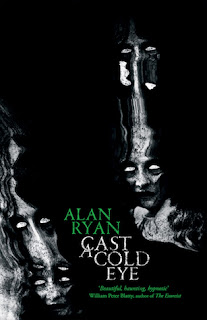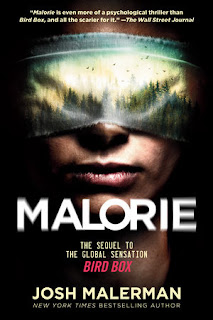{Put This One on Your TBR List}
Book Review: The Ruins
by Scott Smith
by Karen S. Wiesner

Imagine a 523 page paperback novel without chapters. Literally, that mass of pages filled with just words, no blank spaces, other than single line scene breaks. Does the mere idea of such a thing make you want to run screaming in the opposite direction? I suppose if I'd glanced through the book before I started reading it the first time, I might have had a reaction just like that. Instead, I just jumped into The Ruins by Scott Smith, a horror, published in 2006. I spent 15-20 hours of that same day absolutely enthralled. I didn't put the book down for any reason, not to eat (I can do that with one hand), not to be sociable, not to sleep, until I finished reading it. In the years since that first reading, I've done the same in re-reading it. I just can't help it.
This story has a pretty simple setup. Two American college couples are on holiday in Cancun. They meet some other foreigners on vacation. Tourist Mathias came with his brother, who'd been persuaded by a cute girl he met at the hotel to go to some archaeological dig site not too far away. Mathias is desperate to find him, since he's been missing for a while now.
Of the Americans, Jeff (who's studying to be a doctor) is the smart one in the group, the Boy Scout, the one who wants to be everyone's hero. His girlfriend Amy goes along with things, doesn't trust herself to make a decision, and ultimately doesn't really know who she is. She's almost pathetically obedient to Jeff's every command. She desperately doesn't want to accompany Jeff to help Mathias find his brother, but she doesn't know how to refuse. Eric is trying to live up to everyone's expectations and therefore fails to meet his own. He follows the prescribed path that's been laid out before him because it's easier than having to figure out something new for himself. Stacy is the oft-troped "lovable slut" who's blown about by every direction of the wind. The group follows Jeff without question.
As couples, these two are the worst. I can't even imagine how they got together. As friends, maybe Amy and Stacy make a little bit of sense but Jeff and Eric really are just thrust together as friends by the girls they're dating. I don't think they even like each other, though the thought never occurs to either of them. Jeff seems to hate Amy most of the time, to despise her wishy-washiness yet he can't seem to stop bossing her around long enough to really decide why he's with her (because she buckles to his demands?). She seems to idolize him. She's Edith Bunker to her Archie, running around rather stupidly to please him. Quite honestly, I didn't like any of the characters and there was nothing admirable about them. Jeff had the veneer of an extraordinary human, but he was no better than any of the others once the surface was scratched. That said, they were engaging, well-drawn, albeit mildly clichéd.
What happens next after Jeff forces the group to set off to find Mathias's brother is a combination of bad luck and pure stupidity on the part of three sheep followers, one anguished brother, and a would-be savior who ultimately doesn't live up to the hype. Believe it or not, none of this made the book any less enjoyable. Like Stephen King, I found The Ruins evocative and one long, screaming close-up of horror.
Beyond the foundational basis of horror in this story, you'll discover a scathing commentary on the dark side of societal conventions when Nature in all its pitiless indifference forces unsuspecting human prey into a very unique cage. From there, all semblance of control slips slowly, slowly away, never again to be recovered.
The only true failure in this literal breath-stealing novel is its end. As one reviewer says, The Ruins "just misses perfection because something's wrong with the final spin". Oh, how polite. In my opinion, the end stinks. Having read the author's other novel, A Simple Plan, I have to say that he seems to love to hate his own characters. He creates beings that you can't really like because bad qualities far outweigh the good and the decisions made by these villainous heroes are always questionable, making you as the reader feel ashamed if you make any attempt to root for them. I can't help imagining the author as a cruel entity setting up his characters for failure, toying with them and tormenting them only to destroy them in the end--all with a robustly maleficent parting laugh. Part of the genius in the author's method of madness is equally what I think might be his downfall: He refuses to look away from anything. Everything that happens is like a train wreck that chops off heads and limbs, burns babies alive, and crushes a pregnant woman flat between cars. In the case of a horror novel, that's kind of what you expect and want, but anyone with an ounce of decency would stop at the end, at least, and dole out some well-earned and respectful mercy. Not Smith. His ruthlessness carries over, unrelenting, into the very last words of the novel.
While I tend to be the type who enjoys the book more than any film adaptation of it and that's definitely the case of the 2008 movie version of The Ruins (an absolute gore-fest from start to finish, though basically watchable) produced by Ben Stiller's production company, Red Hour Films, there is one area that the film triumphs. The end of the movie is what should have been at the end of the book.
Despite the flaws in this nonstop, ruthless horror novel, I heartily recommend it to other lovers of the genre. Just be sure to watch the end of the movie version afterward to see the story's ideal end.
Karen Wiesner is an award-winning,
multi-genre author of over 150 titles and 16 series.
Visit her website here: https://karenwiesner.weebly.com/
and https://karenwiesner.weebly.com/karens-quill-blog
Find out more about her books and see her art
here: http://www.facebook.com/KarenWiesnerAuthor
Visit her publisher here: https://www.writers-exchange.com/Karen-Wiesner/











































